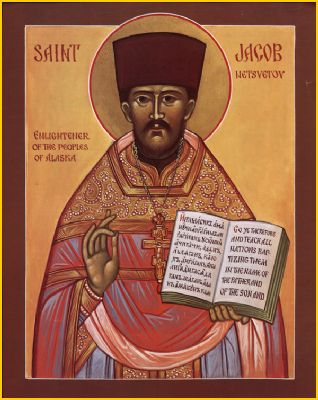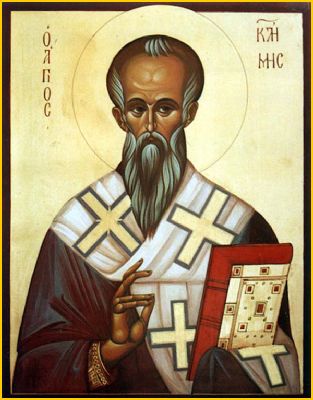|
|||
|---|---|---|---|
| This weekly bulletin insert complements the curriculum published by the Department of Christian Education of the Orthodox Church in America. This and many other Christian Education resources are available at http://dce.oca.org. | |||

The church celebrates two saints with different life circumstances but a shared determination to serve God's people in a particular way. They are Saint Jacob, Enlightener of the Alaskan Peoples, and Saint Clement of Ochrid. A thousand years earlier than Saint Jacob, Saint Clement helped people in Eastern Europe understand their faith by doing some of the same things that Saint Jacob would do in North America in the nineteenth century. Saint Clement was born in 840. He was a disciple of Saints Cyril and Methodius, and took part in their mission to Moravia. Like his great teachers, he wanted the Slavic people to hear the Liturgy and read Scripture in their own language. But serious opposition came in the form of the German missionaries in Moravia, who with the Pope's support insisted that services be in Latin. Clement was imprisoned, ill-treated, and expelled from the country. He reached Bulgaria, and was welcomed as a teacher and a man able to enlighten the people. He opened schools, translated needed texts, and trained many priests. After being consecrated a bishop, his health failing, he finally retired to a monastery he had founded in Ochrid. Clement was the first hierarch of Bulgaria to preach, write and serve in the people's own language. Saint Jacob (Netsvetov) was born in the Aleutian Islands in 1802. He attended seminary in Russia. After graduating, marrying, and being ordained a priest he urgently wanted to return to Alaska, and did so in 1828. Once there Father Jacob faced an immemse task, bearing the responsibility for an area that spread out over several islands in the Bering Sea. But despite exhaustion and the harsh climate, within six months of his arrival he had recorded over 400 chrismations plus baptisms, weddings, and funerals. In 1836, tragedy struck the priest hard. Both his wife and father died, and the family house was destroyed by fire. But with the support of his bishop (later Saint) Innocent he carried on. Like Saint Clement, his chief concern was that people should hear and understand the Liturgy and Scripture in their own languages. He invented two alphabets, translated, and personally taught his people. Later in life he traveled hundreds of miles to minister to families living along the Yukon and Kuskokwim Rivers. 
Saint Jacob also shared with Saint Clement the experience of being badly treated by those who feared his influence. In 1863 he was the victim of false but ugly accusations, and though he was completely cleared, his already-failing health was further undermined. He died a year later. Many of us take for granted having the Bible and worship services in our own language. But these two saints contended with huge difficulties to achieve that goal. Fortunately for us, they didn't let hardships or fierce opposition deter them. No doubt they rejoice when we honor their work by being faithful in church attendance and the reading of Scripture. |
|||
